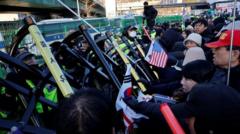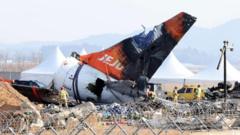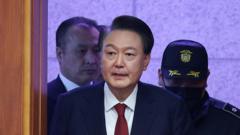The arrest of Yoon Suk Yeol marks a pivotal moment in a deeply divided South Korea, as protests erupt and public sentiment remains sharply polarized over his leadership and recent martial law declaration.
Arrest of President Yoon Sparks Polarization and Protests in South Korea

Arrest of President Yoon Sparks Polarization and Protests in South Korea
Tension escalates as supporters and opponents of South Korea's suspended president Yoon Suk Yeol clash following his arrest.
Tears rolled down the cheeks of supporters, and dismay filled the air outside President Yoon Suk Yeol's residence in Seoul, following the news of his dramatic arrest. The arrest was anticipated, coming after a prolonged standoff that began with an initial failed attempt on January 3. This incident has thrown the nation into heightened uncertainty at a time of intense political division exacerbated by Yoon’s controversial martial law order and subsequent impeachment.
"My country is in crisis," cried an emotional pro-Yoon supporter. Despite shared desires for stability, South Koreans remain at odds over how to achieve it. Over the past month, Yoon, 64, isolated himself within the presidential compound, surrounded by supporters and opponents who turned the Yongsan district into a battleground for protests, creating a chilling atmosphere amidst sub-zero temperatures.
As police equipped with riot gear confronted Yoon's supporters, tensions boiled over. Protesters shouted back against labels of extremism, while across the street, opponents cheered, celebrating what they saw as a historic moment in holding power accountable. The divide over Yoon's administration and allegations of insurrection has rippled throughout the country, crafting a dual narrative forged by his unexpected declaration of martial law on December 3, which some perceived as a legitimate action in the face of threats, while others condemned it as an abuse of authority.
The political climate has shaped the usually lively year-end celebrations into a more subdued affair, particularly in light of a recent aviation tragedy. Yoon, notably absent from public life, attempted to communicate his stance via remote means, igniting frustration among his supporters, many of whom camped near the presidential residence awaiting developments.
Wednesday's operations to execute the arrest warrant meant extensive negotiations with police, highlighting the severity of the unprecedented sit-in that Day. Once Yoon was detained, streets around the compound emptied, but the emotional rift lingered.
Supporters of Yoon have planned subsequent protests, emphasizing their belief in the sanctity of the presidency while arguing that the actions taken by investigating bodies were politically motivated. Meanwhile, Yoon’s legal representatives maintain that the charges leveled against him do not justify the actions taken against the presidency.
The ongoing legal proceedings will be under scrutiny, as they bear the potential to deepen political fractures. As Yoon remains embroiled in controversy and his impeachment trial unfolds, the prospect of unity seems distant, hinting at a sustained era of polarization within South Korean society.
The political theatre surrounding Yoon's arrest not only questions the integrity of leadership but potentially reshapes the very landscape of modern governance in South Korea.




















